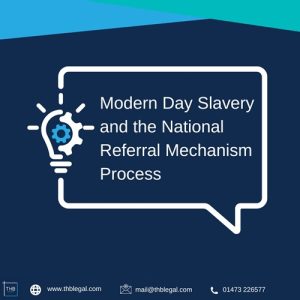Inheritance tax is changing in 2026
What farming families and business owners need to know If you own a farm,...- 11 February 2026
Posted: 01 November 2023
Modern day slavery is currently defined by the UK Government as the recruitment, movement, harbouring or receiving of children, women or men through the use of force, coercion, abuse of vulnerability, deception or other means for the purpose of exploitation. It is a crime under the Modern Slavery Act 2015 and anyone found guilty of this offence can face imprisonment. The most widespread form of modern slavery is debt bondage/bonded labour. This is when someone is trapped in poverty or is forced to borrow money and is then forced to work to pay off the debt. They lose all control of their employment conditions and debts.

The defence of modern slavery can be raised under Section 45 of the Modern Slavery Act 2015 following a referral from the National Referral Mechanism (NRM). This framework has been established to identify and support potential victims of modern slavery. It provides a structured pathway for referring individuals who may have been subject to slavery or exploitation to relevant support services. The NRM referral helps to both identify victims and provide much needed access to support including legal assistance.
There are several crucial factors which determine if someone is a victim of modern-day slavery and if a valid defence can be put forward. These are:
The use of this defence varies for those under the age of 18. The only element which would need to be demonstrated is that the person committed the offence as a consequence of being a victim of modern slavery and that any other reasonable person would have acted in the same way.
A victim of modern slavery would be required to demonstrate to the court why this defence has been raised and provide their account as evidence of this. The National Referral Mechanism (NRM) is greatly beneficial when raising this defence as the information collected and outcome provides details of the exploitation and supporting evidence to help support the victims claim. Albeit not binding, the NRM referral outcome provides strong testimony to which there needs to be significant evidence to contradict it.
The outcome of a recent Court of Appeal hearing ruling in favour of the defendant, demonstrated that if a defence under the Modern Slavery Act has not been advanced because the defendant has not been advised of it. Then there are grounds for the sentence to be quashed as a clear injustice has been done.
Ultimately, the use of modern slavery as a defence is still a complex legal argument. However, there is now further clarity as to the significance of an NRM referral. Plus, what victims of modern slavery can expect; whether they are facing proceedings, or they have already been convicted.
If you require help and advice in these areas contact our Criminal Defence Team at our Chelmsford, Braintree, Ipswich or Benfleet office call 01473 226577 or send an email
- 11 February 2026
- 09 February 2026
- 07 February 2026